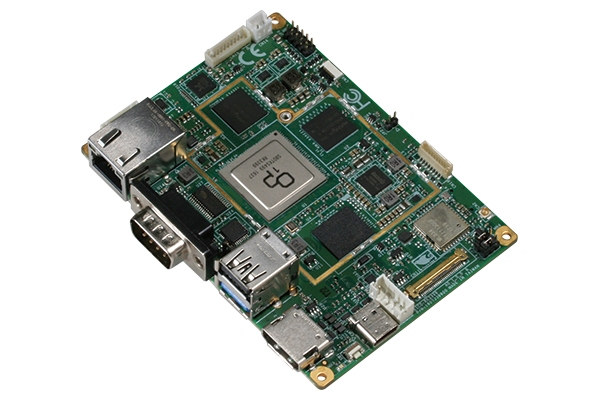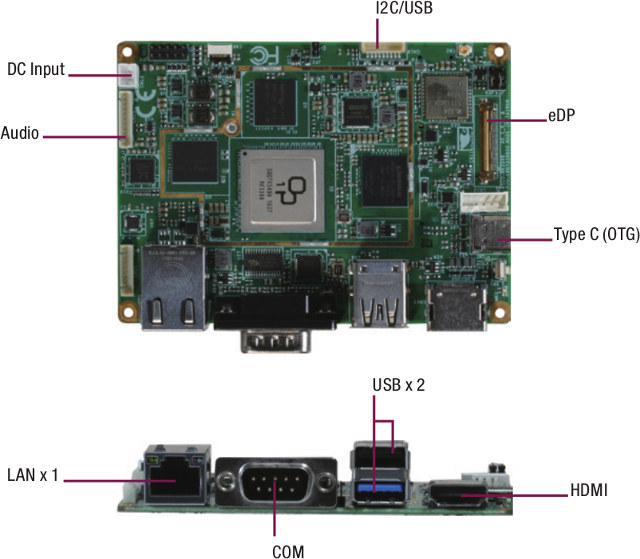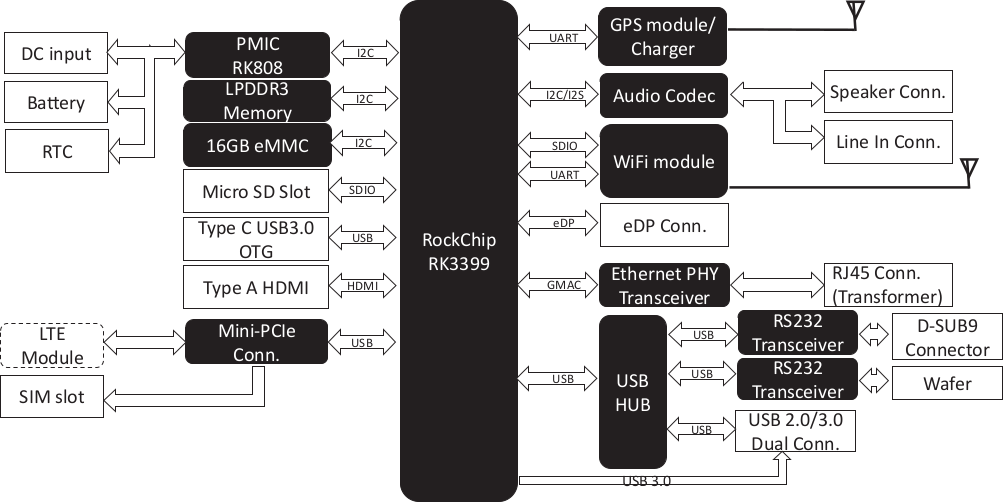We now have a fair amount of boards powered by Rockchip RK3399 hexa-core processor with Firefly-RK3399, Rockchip Sapphire, VideoStrong VS-RD-RK3399, the upcoming 96boards compliant Rock960, among others. But AFAIK, none of those are designed to fit in a standard enclosure.
AAEON will soon change that with an update of their RICO-3288 pico-ITX board, called RICO-RK3399 featuring Rockchip OP1/RK3399 processor combined with 2GB RAM, 16GB eMMC flash, HDMI 2.0, Gigabit Ethernet and more.
 AAEON RICO-3399 specifications:
AAEON RICO-3399 specifications:
- SoC – Rockchip RK3399 (OP1) hexa-core processor with two Cortex A72 cores up to 1.8 GHz, four Cortex A53 cores, and an Arm Mali-T860MP4 GPU
- System Memory – 2GB LPDDR3
- Storage – 16GB eMMC flash, micro SD card slot
- Video Output / Display
- HDMI 2.0 port up to 4K UHD @ 60Hz
- eDP connector for LCD display up to 4K UHD @ 60 Hz
- I2C/USB header for touch panel
- Audio – Via HDMI, 2.5W (by 4Ω) speaker/ microphone/ earphone header
- Connectivity – Gigabit Ethernet, optional WiFi + Bluetooth 4.0 module, optional Nano SIM slot to use with mPCIe modem
- USB – 1x USB Type C port, 1x USB 3.0 port, 1x USB 2.0 port, 1x USB 2.0 pin header
- Serial – 1x RS-232/422/485 (DB9 connector), 1x xRS-232 pin header
- Expansion
- Optional full-size mini-PCIe slot for 3G/4G card
- 8-bit DIO (4-in, 4-out)
- Misc – Watchdog timer, RTC + battery slot
- Power Supply – 12V DC input via 2-pin header, optional 7.4V battery
- Power Consumption – 0.6A @ 12V full load on six cores
- Dimensions – 100 x 72 mm (Pico-ITX form factor)
- Weight – ~400 grams
- Temperature Range – Operating: 0°C ~ 60°C; storage: -40°C ~ 80°C
- Humidity – 0% ~ 90% relative humidity, non-condensing
- MTBF – 80,000 hours
- Certification – CE/FCC
 The board comes with a power cable, and an RTC battery by default, but the company also offers optional accessories namely: a 20cm USB cable, a 15cm serial (COM) cable, a 12V/5A power supply, an NFC board, and/or a GPS & battery charger board.
The board comes with a power cable, and an RTC battery by default, but the company also offers optional accessories namely: a 20cm USB cable, a 15cm serial (COM) cable, a 12V/5A power supply, an NFC board, and/or a GPS & battery charger board.
Two versions of the board will be available:
- RICO-3399-A10-0000 – Without wireless module, LTE slot, battery support, nor GPS
- RICO-3399-A10-0001 – With WiFi and Bluetooth 4.0, support for 3G/4G card, support for 7.4V battery, and optional GPS

The company will support Android 7.0 for the board, but there’s no word about Linux. The company lists the board can be used with a fanless cooling system, but I’d assume it depends on the selected enclosure and overall thermal design. The board targets business applications such as digital signage, kiosk, home automation, smart cameras with facial recognition ability, and more.
The product page shows the board as “coming soon”, and pricing has not been made public.

Jean-Luc started CNX Software in 2010 as a part-time endeavor, before quitting his job as a software engineering manager, and starting to write daily news, and reviews full time later in 2011.
Support CNX Software! Donate via cryptocurrencies, become a Patron on Patreon, or purchase goods on Amazon or Aliexpress. We also use affiliate links in articles to earn commissions if you make a purchase after clicking on those links.





This looks like a well balanced design for POS/Kiosk/HMI applications…
Too bad PCIe is not exposed here 🙁
Just for the sake of completeness… There’s also Theobroma’s RK3399-Q7 + Haikou Q7 baseboard (Mini-ITX): https://www.theobroma-systems.com/haikou-q7-dev-kit/overview
BTW another board is coming — OPi RK3399. It’s already selling on Taobao.
https://item.taobao.com/item.htm?id=564484944766
@tkaiser
It is, there’s a mini PCIe slot on the bottom if you check the product page.
@TLS
Well, mPCIe slot for LTE modems –> USB only (according to diagram). And for RK3399 with 4 PCIe lanes mPCIe would be a stupid choice anyway since limited to a single lane. Then they would’ve used M.2 with M keying…
My bad, I didn’t see that limitation on the diagram. That’s really disappointing, especially as this is unlikely to be a cheap product. My guess is around US$200.
It’s reasonably complete. If they decide to support Linux and if the board is not too expensive, it could make a nice small ARM64 development board. It’s very comparable to some Atom boards I’ve been using in the past for the same purpose.
“pricing has not been made public”
“if the board is not too expensive”
If I understand correctly Aaeon only sells to commercial customers, probably with a minimum order quantity (10+???), and one must use a contact form to obtain a quote.
So if one is looking to buy a single board one will have to find a distributor who actually stocks the product and not just a limited subset of the more popular Aaeon products and pay the appropriate marked up middleman’s price.
Still curious how Xunlong dealt with PCIe there. There’s an ASM1061 or ASM1062 next to the SATA port so one or two PCIe lanes are used to attach the SATA controller. But what’s on the bottom? Is it mPCIe or mSATA?
And why is no one doing a RK3399 device with a buch of PCIe attached 88SE9215 or even 2 x 88SE9235 (using each 2 PCIe lanes) providing 8 or more SATA ports?
@tkaiser
It looks like the Orange Pi board might be using a USB 3.0 to SATA converter and the PCIe is simply used for the mini PCIe slot on the bottom, if at all.
Hmm… x4 PCIe on a x1 mPCIe connector simply doesn’t make that much sense 🙂
I had a look at the RK3399 OPi picture that was ‘leaked’ by Xunlong in April 2017 over at Armbian forum and there are two visible differences: Ampak 6354 exchanged now with 6356S and where an USB3-A receptacle was is now a S/PDIF jack. Still the chip next to the SATA port (and pretty close to the Ampak chip — USB3 nearby 2.4Ghz radio?) looks more like an ASM106x to me than eg. a JMS578.
@tkaiser
I agree that it looks like ASMedia, but it could be something like the ASM1153E.
It would be madness to put it next to the Wi-Fi, but that hasn’t stopped Chinese companies in the past.
Also, the RK3399 has a x4 PCIe interface that would need either support for bifurcation or a multiplexer to bring it out to four x1 lanes, otherwise it can only be connected to a single device, even if only one lane of PCIe is used. My understanding from the documentation that I’ve read for the RK3399 is that it doesn’t appear to support this internally and no external chip seem to be fitted to allow for this. In other words, three PCIe lanes are simply wasted in this case.
It also looks like the second HDMI port is an input, rather than an output, as the Toshiba chip appears to be an HDMI to MIPI-CSI signal converter.
@TLS
Well, then it seems Pine64 folks will provide the most interesting RK3399 board(s) for me: http://irc.pine64.uk/?search=Rockpro64
Rockpro64 is said to be demoed in a week at FOSDEM in Bruxelles…
this board looks very similar to this one:
https://www.cnx-software.com/2018/02/01/amarula-vyasa-is-a-150-pico-itx-single-board-computer-powered-by-rockchip-rk3288-soc/
surely not a coincidence?
RICO-3399 can now be purchased for $187 @ https://eshop.aaeon.com/pico-itx-boards-rico-3399.html
You could go for their Intel board ” AAEON’s de next-TGU8 marks the beginning of a new generation in single board computing, breaking the board space limitation by producing the smallest board featuring an on-board Intel® Core™ i-level processor ever seen. “